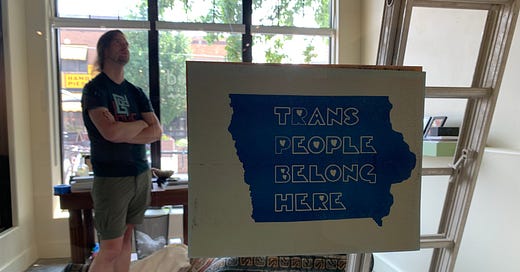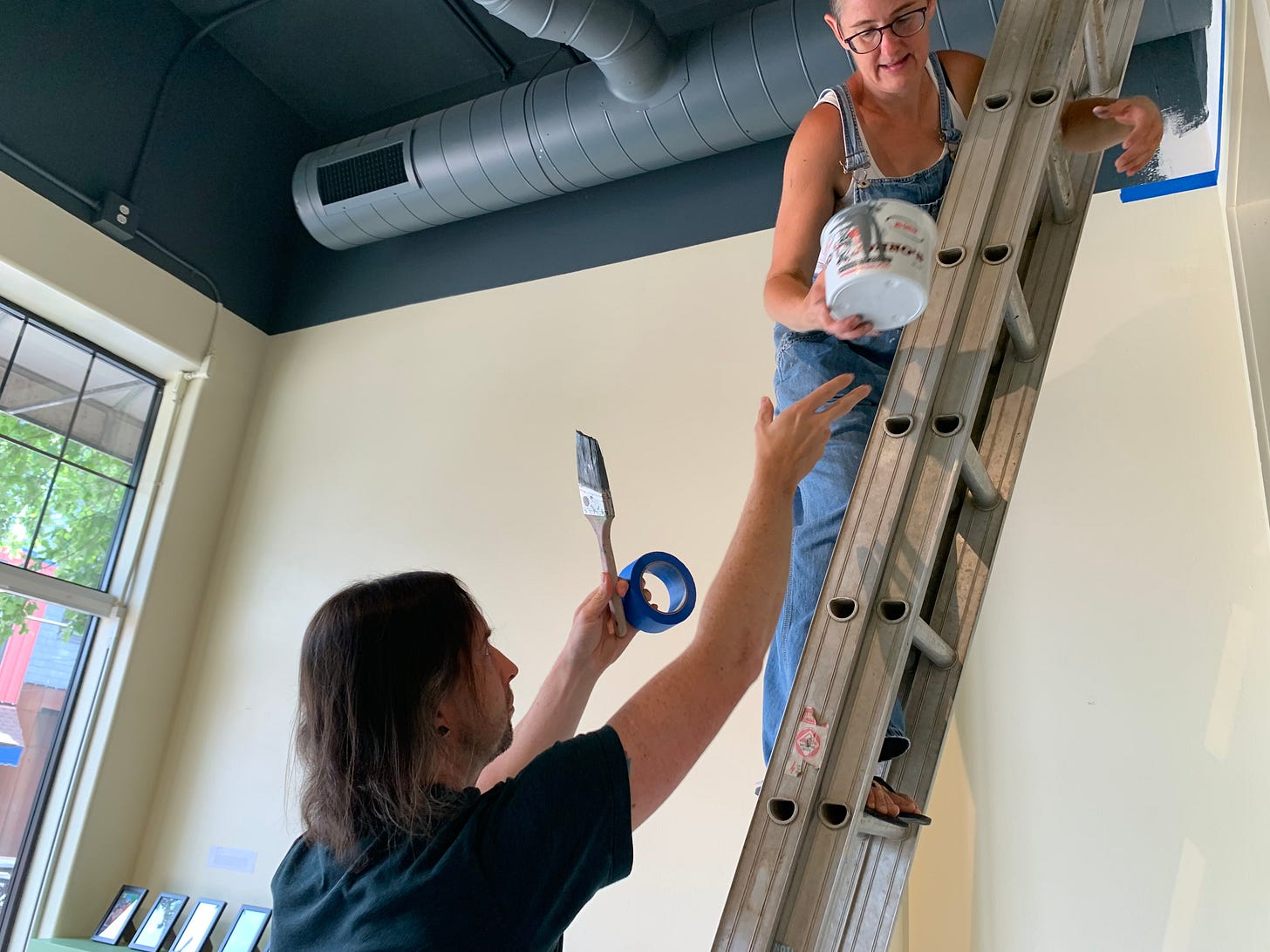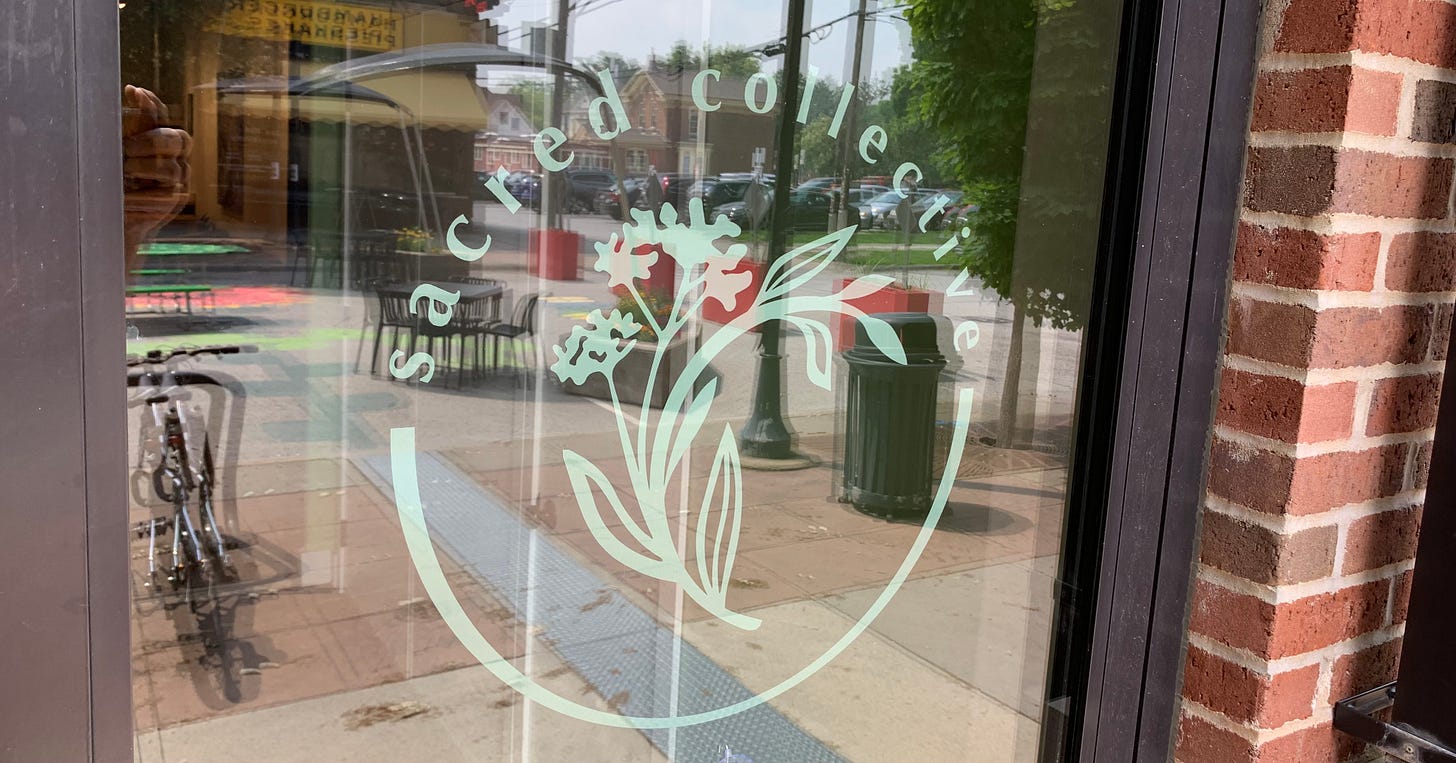Trying times for trans Iowans dealing with new, cruel laws
Some will argue against saying new state laws prohibiting diversity, equity and inclusion programs are cruel, but not Iowans affected by the laws.
The Rev. Sean McRoberts at Sacred Collective, an Iowa City ministry focusing on marginalized college students. (Photo by Lyle Muller)
I needed to catch up with Sean McRoberts. Sean was one of several kids in an exceptional teen Sunday School class I led more than 30 years ago. Those kids were smart.
Kids. They are in their 40s now and Sean is an ordained minister, formerly with the United Methodist Church but now an independent Iowa City ministry called Sacred Collective Sean co-founded with the Rev. Anna Blaedel, who has their own story of being hurt deeply by anti-LGBTQIA+ sentiment and the United Methodist Church. Sacred Collective, a self-described “place of belonging for spiritual misfits centering college students in Iowa City,” is a block and half from the University of Iowa campus, on Linn Street one-half block from my former working home for The Gazette of Cedar Rapids.
Pastor Sean also is trans and goes by the pronoun they — my generation is learning and adjusting about pronouns. They — Sean, that is — also identifies as non-binary, where people don’t feel they fit the definition of being solely male or female, thus “they.”
Sean came out as sexually nonconforming six years ago when the United Methodist Church was on the edge of splitting over lesbian, gay, bisexual, transgender, queer and questioning, intersex and asexual rights. Something told Sean their identity differed from being a typical male. Sean is blessed with a wife who doesn’t shirk communicating about this and gets it, Sean said. They — Sean and wife — are a happily married, one of many things people don’t get when not taking time to understand LGBTQIA+ issues.
I had not planned on talking about being trans but our meeting landed two days after Gov. Kim Reynolds signed into law HF 856: An Act Prohibiting Public Entities From Engaging in Certain Activities Relating to Diversity, Equity, and Inclusion Creating a Private Cause of Action, and Including Effective Date Provisions.
The title is a mouthful. The law, to take effect July 1, is hard to digest for Iowans who feel less than wanted in their state.
How does the anti-trans bill affect you? I asked Sean.
“I have to ask, which one, because it’s been a bad year,” Sean responded. “The one that removed gender identity from the civil rights act? That was the big one that cleared the way for removing coverage for gender-affirming care from Medicaid in Iowa. That one? That was followed by the federal bill currently before the Senate that would remove gender-affirming care from Medicaid and ACA (Affordable Care Act) plans for the entire country? Or, the anti-DEI bill the governor just signed?”
That last one, I said.
The Rev. Sean McRoberts hands items to colleague the Rev. Anna Blaedel while she paints walls on May 29. 2025, at Sacred Collective, an Iowa City ministry. (Photo by Lyle Muller)
Really, though, we were talking about all of the bills passed in this year’s state legislative session and federal actions that are part of Republican promises kept to stop taxpayer support for efforts that support people living on cultural and racial margins or promote knowledge about them.
You know what? Some of this is downright cruel.
“Iowa is becoming a more difficult place to be and there are signs that it is becoming less safe to be in,” Sean said over lunch in Iowa City. “Folks don’t want to raise their kids here either because they’re trans, or their kids are trans, or they don’t want their kids learning hate in school.”
Cigna Healthcare reports that people in LGBTQIA+ communities are at a higher risk than others of having access to health care and have more mental health issues such as suicidal thoughts, mood and eating disorders and substance abuse addictions. They are less likely than others to report poor health care practices, if they have care at all. Lesbian and bisexual women have higher rates of breast cancer than others have.
The nation’s crime rate dropped in 2023, but not if you are lesbian, gay, bisexual, trans, queer or questioning. Hate crimes against them was spiking in 2023, the FBI reported. If you need more information from the federal level, a June 1 front-page Cedar Rapids Gazette story by Vanessa Miller reported that the Trump administration has clipped $1 billion in contracts with for health-related research of HIV, AIDS, COVID and clinical trials with LGBTQIA+, racial or ethnic populations in the trials.
Iowa House Speaker Pat Grassley made a passing reference to Iowa’s legislation affecting LGBTQIA+ Iowans in a May 30 newsletter, couching it in terms designed to frighten folks regardless of what the Iowa Civil Liberties Union calls their mythical stature: “This session, we took action to protect the policies we had passed in previous years that protect girls' sports, ban gender affirming care on minors and protect Iowa taxpayer dollars from gender reassignment surgeries.”
Sacred Collective, the Iowa City ministry focusing on marginalized college students, is at 213 N. Linn Street. (Photo by Lyle Muller)
As government abdicates its willingness to help these people, health communities are stepping into the gap. This weekend, June 13-15, the United Methodist Church Iowa Annual Conference is meeting at the RecPlex in West Des Moines and is to take up two resolutions supporting LGBTQIA+ people and one resolution supporting immigrants. Beyond those statements, the Iowa Conference announced in late May the appointment of its first multicultural and anti-racism ministries director, the Rev. Betty Kiboko.
Pastor Sean, who testified at the Legislature earlier this year in opposition to the anti-gay bills, has made a lot of waves since those long-passed Sunday School days. Ordained as a United Methodist pastor, Sean took a leave of absence in 2019 in protest of the church’s General Conference policies and discrimination against LGBTQIA+ people and withdrew from the denomination in 2022, disenchanted with its unwillingness then to allow same-sex pastors and marriages in its churches.
Church policy changed in 2024 when the United Methodist General Conference, responsible for the church worldwide, dropped the ban but allows local churches to decide if they want an LGBTQIA+ pastor or allow same-sex or non-binary weddings.
It is a shame that people like Pastor Sean felt so pushed away that they no longer are part of the United Methodist discussions. But at least they are increasing the pressure with other faith communities, including United Methodists, of their resistance in a state that says they do not matter as much as those in power. Expect more, louder, visible actions from these communities in the coming months.
EPILOGUE
Sean and I joked about how the “poor” (air quotes, there) leadership they had in Sunday School led them to be a radical preacher who tries to bring peace and acceptance for all into his ministry. Perhaps, we focused too much in those Sunday School classes on the Bible’s social outcasts. There was Tamar, the conniving widow who posed as a prostitute in order to seduce her father-in-law, Judah, after her husband’s death so that she could have Judah’s baby and continue the line of David. David — don’t even start on how he seduced his top general’s wife and sent the general into fatal battle in order to get rid of that marital nuisance.
The students’ favorite Biblical character was Rahab, the prostitute — inkeeper, wink, wink — who hid Joshua’s soldiers so that Joshua could win the battle of Jericho. Why did the soldiers stay at Rahab’s place for so long? the students discussed.
Too explicit? You can read all about the sexcapades, which include notions of sexual behavior that would not conform with modern-day definition, in a book that is allowed on school library shelves. That’s the one with stories about a Jewish rabbi who preached about caring for the downtrodden.
You never know. Some kid just might read what Jesus says in that book and become a radical preacher simply by virtue of following the example. Being mean isn’t the big win some people in power think it is.
A related version of this column appeared in the Thursday, June 12, Des Moines Register.
Lyle Muller is a retired Iowa journalist who still works as an independent contractor and professional adviser for Grinnell College’s Scarlet & Black newspaper. He is board member of the Midwest Center for Investigative Reporting and Iowa High School Press Association, a trustee of the Iowa Freedom of Information Council, former executive director/editor of the Iowa Center for Public Journalism that became part of the Midwest Center, and former editor of The Gazette (Cedar Rapids). He is a recipient of the Iowa Newspaper Association’s Distinguished Service Award, Iowa College Media’s Association’s Eighmey Award, and Iowa Newspaper Association’s Stratton Award.






